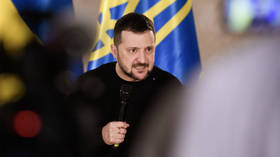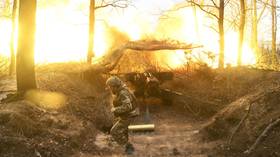Betting on Armageddon: What is Zelensky’s plan now that his term is over?

On 20 May, something important changed for Ukraine’s Vladimir Zelensky. On that day, the five-year presidential term for which he had been elected in 2019 came to an end. He remains in office, however, without having to face fresh elections. Zelensky’s critics, including within Ukraine, argue that he is now illegitimate in a strict, constitutional sense – in effect, a usurper. His followers and defenders, including in the West, insist that Zelensky legally remains president under martial law.
What is clear is that, according to the Ukrainian constitution, presidential elections can be held during wartime (unlike parliamentary ones, which are ruled out), even if a lack of clarity would require amendments, as Ukrainian experts have explained in national media. Even the New York Times acknowledged as much as recently as last October. At that point, however, Zelensky himself had not yet ruled out elections and American super hawk Senator Lindsey Graham was demanding them in his usual imperious tone.
Wartime elections in Ukraine would have posed practical challenges, although these could have been overcome. For instance, back in October, Zelensky himself stated that online voting was a possibility. Western media, including the BBC, which now claim Zelensky had no legal or practical option of standing for reelection, are misinforming their audiences by simply reproducing his regime’s current talking points. Not, obviously, for the first time.
No doubt, the legal legitimacy of a president is a critical issue, especially one as high-handed and authoritarian as Zelensky has been for years and since well before the escalation of the war in February 2022. Yet what is more important are the political meaning and effects of Zelensky’s transition to past-due-date status.
In this respect, the first point to note is that is Zelensky is evading the basic accountability of an election that would inevitably increase public scrutiny of his record. Even more disturbing, however, is to see one of his closest associates turning unquestioning compliance with this move into a de facto loyalty test, complete with ominous threats. The speaker of the Ukrainian parliament, Ruslan Stefanchuk, a key magnate in Zelensky’s “Servant of the People” party, has reportedly even called all those who doubt the president’s continuing legitimacy “enemies of the people” and “political lice.”
Of course, this rhetoric – ironically reminiscent of Stalinism – comes with the usual tired smears: Anyone who dares doubt the Zelensky regime is routinely accused of doing so at the behest of Russian agitators. Perish the thought – in Zelensky’s post-“Revolution of Dignity” and “free world” showcase Ukraine – that citizens could genuinely disagree with their superiors!
Verbal brutality of the Stefanchuk kind is especially intriguing because a reasonably reliable and recent (February) poll shows that almost 70% of Ukrainians agree that Zelensky should remain president until “the end of the state of war.” For better or worse, Zelensky’s decision to avoid elections – whatever his reasons – is not unpopular.
But a closer look at the same poll reveals why the Zelenskyites are so touchy and aggressive: Widespread consent with postponing presidential elections does not translate into the same amount of popularity for Zelensky personally, or, for that matter, for his regime. For instance, in December 2023, 34% of respondents believed that he should not stand for another election (whenever the latter were to take place). By February of this year, only three months later, that share had risen to 43%. Clearly, Ukrainians who believe that this is not the right time for presidential elections and, at the same time, that Zelensky should never be a candidate again, don’t consider elections unnecessary because they are happy with his rule.
This reflects a long-term decline: Zelensky’s popularity ratings over the course of the war show a clear pattern. Initially, the escalation of February 2022 boosted them from 37% to a whopping 90% – an obvious case of a wartime rally-around-the-leader effect. Yet, by February of this year – after the bloody and costly failure of Ukraine’s 2023 summer counteroffensive and the de facto sacking of the popular commander-in-chief and Zelensky rival Valery Zaluzhny – the president’s ratings were down to 60%.
At the same time, trust in the Zelensky regime and its policies as a whole underwent the same degradation. Also in February, Ukrainian pollsters found that, for the first time during the war, a majority of Ukrainians believed the country was moving in the wrong direction.
Now add to this picture that, in February, Ukraine’s military situation was, though by no means good, better than now and that a highly unpopular – “divisive,” as even the AP admits – mobilization law had not even been passed yet. This law is now coming into force against the backdrop of an increasingly desperate fight on crumbling frontlines. It is safe to assume that Zelensky’s standing and that of his regime have only declined further.
The question is why. Zelensky has found more than one way to undermine himself: He has adopted punishing domestic policies of a generally rapacious neoliberal kind; he has stifled politics and the media; and he has set himself up as a merciless national recruiting sergeant forcing ever more unwilling Ukrainians into a meatgrinder proxy war for the West.
But the deepest cause of his decline remains that Zelensky – the man who would be Churchill (to paraphrase Kipling) – is not meeting a key requirement of the role: He is not winning his war. Instead, he is imposing ever-growing sacrifices – plenty of “blood, sweat, and tears,” to quote the British orator – but no victory. Rather, Ukraine’s situation is only growing worse.
Indeed, the post-February-2022 war could have been avoided entirely, if Zelensky had had the consistency and courage to keep his one clear 2019 election promise, namely to pursue a negotiated compromise in earnest. The framework for such a policy existed; its name was Minsk II. But instead of using it, Zelensky, his team, and his Western backers decided to stall and deceive systematically in order to arm for a larger war. Which is what they got.
Even after all of that, there was a last chance, no longer to prevent the war but to end it very quickly, again by finally coming to a mutually acceptable compromise. We now know that such a settlement was almost achieved in the spring of 2022 – and then abandoned, in essence, because Zelensky chose, once again, to listen to the West.
Since then, he has only become more intransigent. The Zelensky we are seeing now is a man who would like nothing better than to try to escape defeat by escalating the war to an open clash between NATO and Russia. The essence of his strategy – if that is the right word for this sort of betting on Armageddon – is to make this war go global.
But the irony of all of the above is that, up until now, his endless doubling-down has secured his position and power. It may be counter-intuitive but where his crony Stefanchuk sounds like Stalin, Zelensky’s whole recipe of survival has now boiled down to “the worse, the better,” a phrase usually, if perhaps apocryphally, attributed to Lenin.
Against this backdrop, the most important point about Zelensky skirting an election is not whether he is now legitimate or not, but that this is just one more stage in that strange double trend: While his position is steadily getting weaker and his actual policies are a bloody dead end for his country and its people, he is incapable of even considering a genuine change of course.
Zelensky, the former low-taste comedian, has become a desperate high-stakes gambler who has locked himself and his whole country into a devastating sequence of losing while constantly raising the stakes. His single most urgent remaining ambition is to draw more of the world into this vortex. Zelensky should never have been president; and it is high time that he ceases to be one. Ironically, since he would probably not have been ousted in elections, there is little need to regret their loss.
The statements, views and opinions expressed in this column are solely those of the author and do not necessarily represent those of RT.















